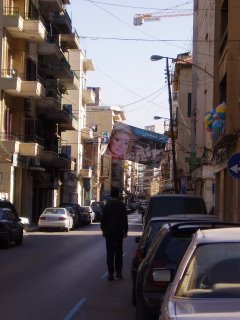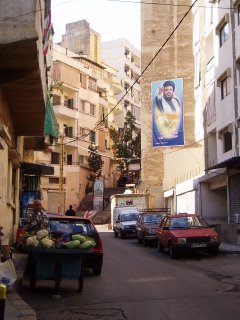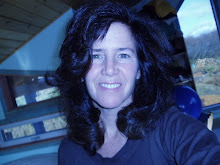

Last night, working away on our draft Oil Spill Contingency Plan for the Zouq Power Plant north of Beirut, Ravina came in to tell Diane and me that Pierre Gemayel, the Minister of Industry, had just been assassinated while driving the streets north of Beirut. The city was now in a gridlock, and other Green Line members, en route to the office for a 5 O'clock meeting, were stranded in the tangled traffic of various sectors around town. Once again, Wael, calling from his cell phone while out of town to evaluate a new Eco-village, advised me to take the back roads home and lay a little low - as he and Zena had advised when the 5 Ministers had resigned from the government last week, leading many to anticipate demonstrations in the downtown area. At Green Line, a virus had overtaken Diane's computer, killing our Internet access, so I was relieved when Ravina suggested we leave a little earlier than our usual 8 PM. Another assassination...and things had seemed so "normal" lately, despite the government's fragile hold on order. The Lebanese know that any mirage of stability is tenuous, susceptible to outrage with a single gun shot ...
For the past few weeks, the image of Hariri has invaded every plane of my view. His visage looms above the highways, erected every 100 meters or so throughout every part of the country that I've seen. He peers down on central Beirut from billboards you can see from across sectors. The billboard has a pleasant head shot of Hariri, and in the background lay the remains of a demolished building scattered about deep pit in the city. Since the civil war, Hariri has been credited with much of the re-building effort in Beirut, so I assumed the billboard celebrated these projects, showing the demolition of an old bombed-out building, soon to be replaced by something new and functional. While my ability to read Arabic has improved, I have a pretty poor dictionary, so the phrase over the billboard, "Lan nansa" (or something like that, as Arabic written text does not include short vowels) made no sense to me. As the days passed and I wandered further throughout the city, I saw similar billboards with the faces of others in front of various piles of debris. A few days ago, Zena once again re-set my frame of reference. These billboards, she explained, represent the many who've been assassinated, starting with Hariri in February 2005. "La Nansa" (I am guessing at the vowels here) is somewhat equivalent to "never forget..." and each image depicts the person assassinated and the site where it occurred, including the shrapnel of their bombed vehicle or the rubble of the blown-up building they occupied.
Once back at the house in Achrafieh, I couldn't pull myself from the news. I was unable to log on to the Internet, as Wael's computer has reverted to a password-protected access mode... For the next 3 hours, I channel-surfed between BBC, CNN, and NBC-Europe, frustrated that I could not e-mail my chronically worried mother that I was safe in Beirut. Due to my brother's history here during the civil war, the country evokes mixed feelings in my family.
My walk home last night was surreal. Avoiding the downtown area, but seeing it in the distance, empty, completely still, and populated by no one but military troops, I took the back alleys through one of my favorite neighborhoods, Basta Tahta (pronounced something like Beh-steh Teh-HEH-teh). This neighborhood is very Muslim, with most of the women veiled, kids running through the streets, and men clustered around backgammon boards with the news booming forth from a small TV or radio. Even here, there was an odd tension - maybe I imagines it - but it felt different. It was the night before the national holiday, Independence Day, though most Lebanese don't take it very seriously... They may be independent of the French, but there is always some foreign finger scratching below the nation's surface. Was the assassination in any way tied to the holiday? Are the shuttered businesses and empty streets of Christian sectors of the city part of a holiday closure, or in respect for the 3-day mourning period following the death of a Christian Minister? Yet, even the business that were open in Gemayzee, Yesouieh, and Nasra had their windows protected with roll-down bars.
The first photo in today's post is of one of these billboards hanging over the noticeably EMPTY Rue Gourand, of Gemayzee. Keep in mind that it is Wednesday at about 10 in the morning, and traffic is normally at a stand-still still on this street. The woman on the billboard is a journalist known for her out-spokenness on Syria; she survived, but now has a prosthetic arm and leg. She continues to anchor on TV, frequently in outfits that expose her new deformities.
The next photo shows one of my favorite streets in the Basta Tahta sector, with Nasrallah larger-than-life above the neighborhood. I don't know what to think about this man. What IS his plan? If Hisbollah truly wants to be observed by the west, why doesn't he push for the tribunal? If the tribunal does expose Syria's responsibility for Hariri's death, can't Hisbollah simply say, "OK, we don't support terrorist acts," condemn the act, and cut their ties to Syria? If so, maybe that first step will open the dialogue. There are still many unknowns, but the Lebanese seem the most aversive to a religious state; a complete conversion to an Islamic government seems highly unlikely. For now, the most important element is to save Lebanon from devolving into yet another civil war - it can lead to nothing but more senseless death and destruction, and exhausted after the bombardment this past July, I trust the Lebanese to avoid this demise - at least I hope so, for their own sanity.
On a more hopeful note, I continue to meet some amazing people who are trying to look after the treasures of Lebanon - it's unbelievable cultural ruins, the (disappearing) wildlife, the stunning (but filthy) beaches. Dr. Ghassan Ramadan-Jaradi is an ornithologist I spoke with today about developing trained local crews for bird recovery and treatment in the event of future oil spills. This country's challenges are many, but focusing on the small victories that may come painfully slowly will hopefully lead to long-term benefits that can eventually guide Lebanon to a new future.


No comments:
Post a Comment